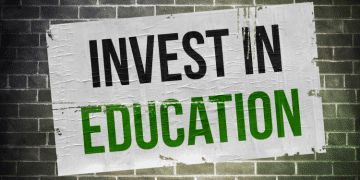Financial literacy programs for young adults: why they matter

Financial literacy programs for young adults equip participants with essential skills in budgeting, saving, and investing, empowering them to make informed financial decisions and achieve long-term financial stability.
Financial literacy programs for young adults are essential in today’s world. With the right knowledge, they can navigate their financial futures with confidence. Are you ready to discover how to empower young adults in making informed decisions?
Understanding financial literacy
Understanding financial literacy is the foundation for making informed decisions about money. It involves knowing how to manage your finances effectively, including budgeting, saving, and investing.
Many young adults face challenges when it comes to handling money. Without financial literacy, it’s easy to fall into debt or make poor financial choices. By grasping essential concepts, young adults can build a secure future.
Key Components of Financial Literacy
There are several key components that make up financial literacy. Understanding these can help young adults grasp the basics:
- Budgeting: Learning how to create a budget helps you track your income and expenses.
- Saving: Knowing the importance of saving for emergencies or future goals can lead to financial stability.
- Investing: Understanding how to invest wisely can help grow wealth over time.
- Credit Management: Learning how credit works and how to manage debt is crucial for financial health.
Each of these components plays a role in building confidence and skills in managing personal finances. When young adults have a solid grasp of these concepts, they can navigate financial decisions more effectively.
Furthermore, participating in discussions about money with peers fosters better understanding. Engaging with financial topics can make learning enjoyable and relevant. Many young adults find that when they talk about financial literacy, they gain insights they didn’t know they needed.
Incorporating financial education into everyday life can lead to better outcomes. For instance, understanding spending habits can help avoid unnecessary expenses. It’s also beneficial to seek out resources and programs that offer guidance on financial matters.
By prioritizing financial literacy, young adults set the stage for a healthy relationship with money. Awareness leads to wise choices and a brighter financial future.
Importance of budgeting for young adults
The importance of budgeting for young adults cannot be overstated. A budget serves as a roadmap for managing income and expenses, making it easier to reach financial goals.
When young adults create a budget, they gain a clearer understanding of their spending habits. This knowledge allows them to make informed decisions about what they can afford and what they need to cut back on.
Benefits of Budgeting
Implementing a budget offers several key benefits:
- Control over finances: With a budget, young adults can see where their money goes and adjust accordingly.
- Goal setting: Budgeting helps in setting realistic financial goals, whether it’s saving for college, a car, or a trip.
- Debt management: A clear budget allows young adults to allocate funds towards paying down debt.
- Emergency savings: Budgets can include a section for savings, preparing young adults for unexpected expenses.
Establishing a budget also encourages young adults to adopt a disciplined approach to finances. Regularly reviewing spending patterns and adjusting the budget helps strengthen financial habits over time. For instance, identifying unnecessary expenses can lead to better choices in spending.
Additionally, budgeting fosters a sense of accountability. When young adults track their progress towards financial goals, they are more likely to stay committed to their financial plans. This accountability can significantly boost confidence in managing money.
In essence, a well-crafted budget lays the foundation for long-term financial success. It empowers young adults to take charge of their financial lives and provides clarity, direction, and security in their financial journeys.
Choosing the right financial literacy program

Choosing the right financial literacy program is crucial for young adults seeking to improve their financial skills. With many programs available, it’s important to find one that aligns with individual needs and learning styles.
When evaluating programs, consider factors such as the content offered and the format of the lessons. For instance, online courses provide flexibility, while in-person workshops might offer interactive experiences. Assessing these options ensures that young adults can engage in a way that suits them best.
Key Factors to Consider
Here are some important factors to keep in mind while choosing:
- Accreditation: Look for programs that are recognized by reputable organizations.
- Curriculum: Ensure the program covers essential topics like budgeting, saving, investing, and credit management.
- Instructor Expertise: Check if the instructors have relevant experience in finance or education.
- Reviews and Testimonials: Reading feedback from past participants can give insight into the program’s effectiveness.
In addition to these factors, young adults should think about their personal learning preferences. Some may prefer hands-on activities, while others might benefit from theoretical knowledge. Matching the program’s approach with personal preferences can enhance learning outcomes.
Another critical aspect to consider is the cost of the program. Many free resources are available online, while some structured courses may charge a fee. Weighing the benefits against the costs is essential to making a wise decision.
Moreover, young adults should seek recommendations from peers or mentors. Hearing about others’ experiences can help in finding valuable programs. Engaging in discussions about financial education can also provide additional insights.
Ultimately, the right financial literacy program should equip young adults with the tools they need for sound financial management. This foundation will help them make informed decisions now and in the future.
Real-life benefits of financial education
The real-life benefits of financial education are significant and far-reaching. When young adults understand financial concepts, they can make smarter decisions that impact their daily lives and future.
One major benefit is improved money management skills. With a solid understanding of finances, young adults can budget effectively, save for emergencies, and plan for major expenses. This foundation promotes financial stability and confidence.
Key Benefits to Consider
Here are some key benefits that highlight the importance of financial education:
- Debt Reduction: Financial education helps individuals recognize the implications of debt and teaches repayment strategies, reducing reliance on loans.
- Savings Growth: With knowledge about savings accounts and investment options, individuals can grow their wealth over time.
- Better Spending Decisions: Understanding needs vs. wants leads to more informed purchases, improving overall financial health.
- Financial Independence: Equipped with skills, individuals are more capable of achieving financial independence sooner in life.
Furthermore, financial education encourages goal-setting. Young adults can confidently set and work towards goals, such as saving for college expenses or a first home. Knowing how to create actionable steps makes these goals feel attainable.
Another vital aspect of financial education is the awareness it brings about financial products, such as insurance, stocks, and retirement accounts. Young adults can make informed decisions about which products best fit their needs.
Moreover, financial education promotes responsible habits that last a lifetime. By instilling good practices early, young individuals are more likely to keep their financial health in check as they grow older. These skills serve them well in both personal and professional environments.
In conclusion, the benefits of financial education are immense, ranging from immediate money management improvements to long-term financial security. Overall, fostering these skills equips young adults for a successful financial future.
How to get started with financial literacy
Getting started with financial literacy is easier than many think. The first step is acknowledging the need to learn about managing money effectively.
One effective way to begin is by setting goals. Determine what aspects of financial literacy you want to focus on, whether it’s budgeting, saving, or investing. Having clear objectives will guide your learning path.
Steps to Begin Your Journey
Here are some practical steps to help you get started:
- Educate Yourself: Look for books, online courses, and podcasts that cover financial topics. Resources like Khan Academy and Coursera offer free courses.
- Practice Budgeting: Create your first budget by listing your income and expenses. Try various budgeting methods, like the 50/30/20 rule, to find what works for you.
- Track Your Spending: Use apps or spreadsheets to monitor where your money goes each month. Identifying habits can help you make necessary changes.
- Seek Advice: Talk to friends, family, or financial advisors. Learning from their experiences can provide valuable insights.
Furthermore, exploring financial literacy programs offered in schools or community centers can provide structured learning opportunities. Many organizations have workshops designed for young adults that make learning engaging and interactive.
Consistency is key in this journey. Set aside time each week to focus on your financial education. Small, regular efforts lead to substantial long-term knowledge.
As you progress, challenge yourself to learn about advanced topics like investing in stocks or understanding credit scores. Expanding your knowledge continuously will build confidence in making informed financial decisions.
In incorporating these practices, young adults can start their financial education journey. The effort invested today pays off with lifelong financial benefits.
FAQ – Frequently Asked Questions about Financial Literacy Programs for Young Adults
What is financial literacy?
Financial literacy is the ability to understand and manage your finances, including budgeting, saving, and investing.
How can budgeting improve my financial situation?
Budgeting helps track your income and expenses, allowing you to make informed decisions and reduce unnecessary spending.
Why is it important for young adults to learn about financial literacy?
Learning financial literacy empowers young adults to make informed choices, avoid debt, and achieve financial independence.
What resources can I use to improve my financial literacy?
You can use books, online courses, workshops, or financial apps to enhance your financial literacy knowledge.





